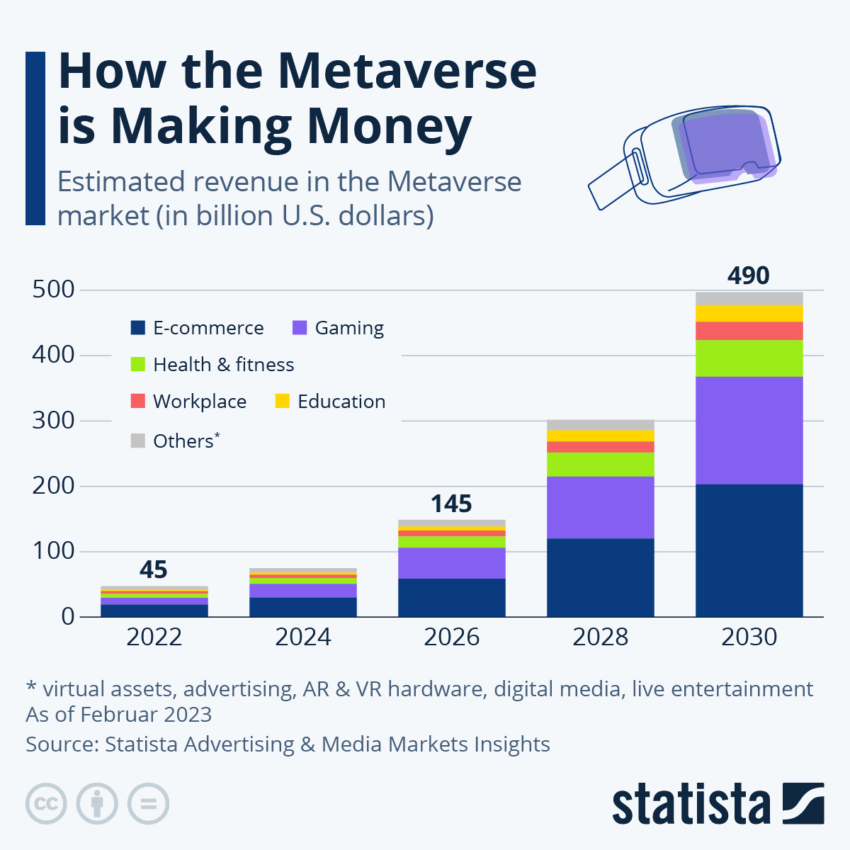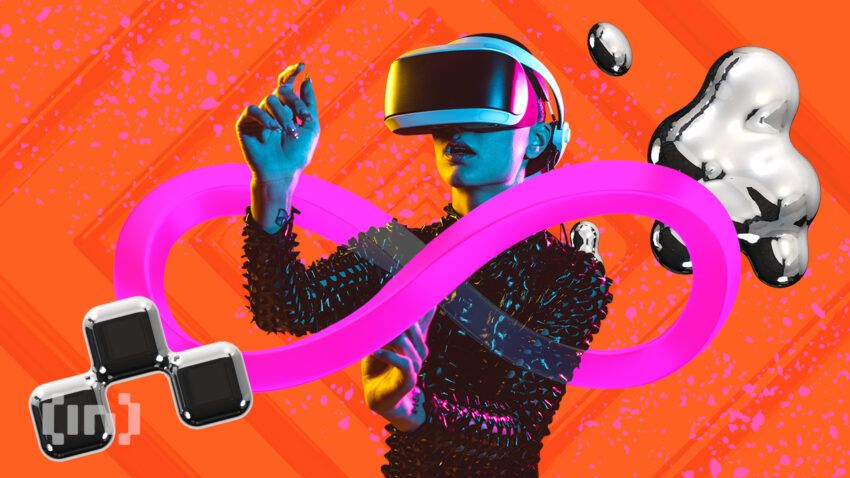What is the metaverse, and who still believes in it? Those two questions have become harder to answer in the last year. But for Ryan Gill, founder and CEO of Crucible, a seedbed for the “open metaverse,” the most viable future is a truly open, interconnected virtual world.
The metaverse has faced skepticism since interest peaked in January 2022. Since those halcyon days when Facebook rebranded as Meta, attention has strayed from the term “metaverse” and toward more voguish technologies, most notably artificial intelligence (AI). Meanwhile, Facebook and other tech companies have instituted user policies that threaten privacy even more than some forms of government repression, Gill believes.
Interest in the Metaverse Is Near Its All-Time Low
According to Google Trends, the world’s most important interest aggregator, worldwide interest in the “metaverse” is nearly as low as before the Meta rebrand, back when the term was siloed in the crypto sphere.
Gill, however, is nonplussed by the steady fall of the term. “Media hype cycles come and go,” he said.
“The Metaverse has had more than one. But today, there are 300 million players in user-generated worlds like Roblox or Minecraft – and these experiences are the emerging Metaverse. So to say it’s dead is nothing more than the media needing a narrative.”
And he’s not wrong about their popularity. As of July 2023, Minecraft, the game where players build and create using 3D blocks, has over 140 million users. Numbers comparable to the populations of Japan, Russia, and Mexico.
Roblox, which allows players to create games to play and share with others, has more than 67.3 million daily active users, not far off the numbers of Brits, French, and Thais.

But the obvious question is: if games like Minecraft and Roblox are the emerging metaverse, what does the finished product look like? Because there’s a risk that massive multiplayer online games simply receive a rebrand.
So, what is the difference between a multiplayer digital world and a true metaverse?
The Metaverse Should Mean Interoperability
For Gill, it is the vision of a truly interconnected and interoperable virtual world. What many in the industry call an “open metaverse.” A 3D analog to the blank slate of the world wide web. Gill continued:
“It’s what happens when worlds connect, in the same way that the internet is made of websites. The Metaverse is the internet built by game developers. The Open Metaverse is the natural extension of this shift to more immersive online experiences.”
To achieve this, intensive effort focuses on ensuring 3D assets and experiences work across different virtual worlds, explained Gill.
“For example, I would want my avatar to look and act the same way no matter what world I’m in,” he said.
Learn more about what the ‘metaverse’ means with our handy guide: What Is the Metaverse? The Digital World of the Future
Central to that vision is the blockchain, where transactions, digital assets, and entire worlds can become part of the decentralized public realm.
Decentralized metaverses like Decentraland and The Sandbox are proof that the concept can work, even if they struggle with keeping a large user base, believes Gill.
However, as metaverses become more routine, and billions of people’s social lives become increasingly virtual, there is a risk our behavior becomes accountable to a corporate tech giant. The danger is extremely grave.
“Every time you click ‘Accept’ on a terms of service, whether it’s Facebook or Apple, you’re signing on to a different kind of regulation,” said Gill. “The ‘laws’ of the large platforms. We give up personal agency every time we enter one of these big corporate silos.”
In Gill’s view, corporate regulation can be even more insidious than the repressive policies of governments.
Data Sovereignty Is Key
Users (or “players”) seldom view the terms of service as seriously as those set by their elected representatives. But when it comes to digital sovereignty, the tech giants present as much of a threat as many governments.
For a metaverse to be truly open and free, control over one’s data must be at the forefront, Gill maintained. He went on:
“Data rights are human rights. And how we express ourselves in digital spaces, how our identity is managed, and how much we give up to large corporations or AI ‘machines’ will be the defining cultural battle. In today’s games, we don’t own our identities, our inventories, and we need to rely on large players to protect us.”
The solution? Put the power in the hands of developers, said Gill, and move past “all the clever technology.” The key thing is interoperability, that source of future innovation.
On July 20, Gill’s company, Crucible, announced the launch of Emergence SDK. A software development kit developed alongside the Open Meta Association, of which Gill is a founder. The kit was built with the open metaverse in mind.
“When game devs use Emergence to build worlds, they become interoperable,” he explained. “Players can move around freely across worlds as different avatar personas and collect purchases in one wallet.”
The Metaverse Standards Forum
Luckily for fans of an open and free digital world, Crucible and co. aren’t the only ones in the fight. In June 2022, parts of the tech industry came together to form the Metaverse Standards Forum.
It’s a group of tech players – small, medium, and large – who want to design a set of common standards for this emerging, immersive world. Already, corporate giants like Amazon, VISA, Dell, Intel, LG, and brands like the NBA are involved.
The hope is that, eventually, the parties will come to an agreement on how to establish this theoretical, interconnected world. Because, until then, an “open metaverse” is little more than a pipe dream.
Disclaimer
In adherence to the Trust Project guidelines, BeInCrypto is committed to unbiased, transparent reporting. This news article aims to provide accurate, timely information. However, readers are advised to verify facts independently and consult with a professional before making any decisions based on this content. Please note that our Terms and Conditions, Privacy Policy, and Disclaimers have been updated.


